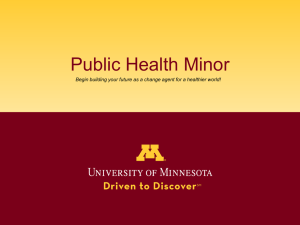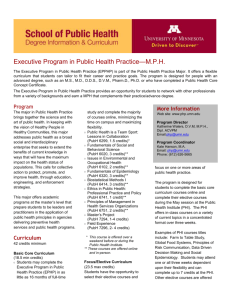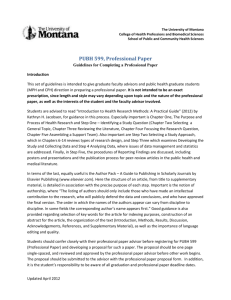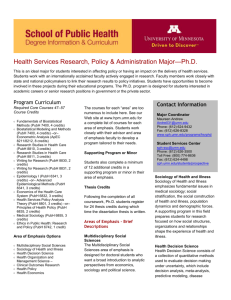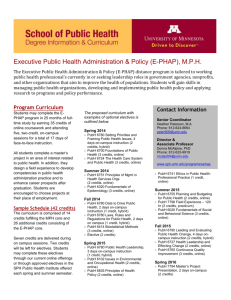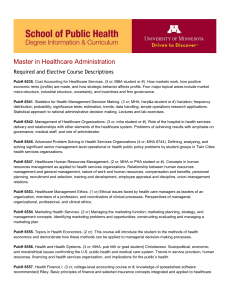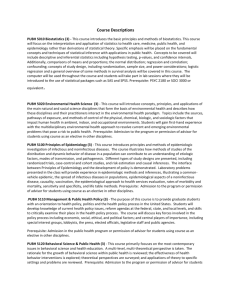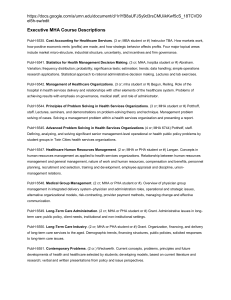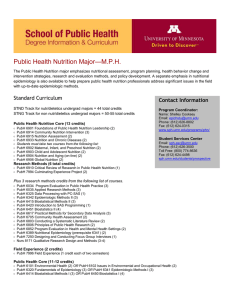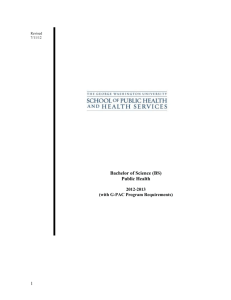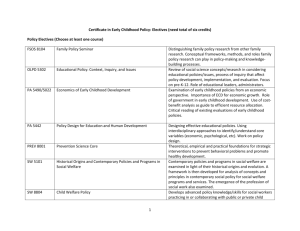EXAMPLE Curriculum Sheet - PHAP DRAFT Columns
advertisement
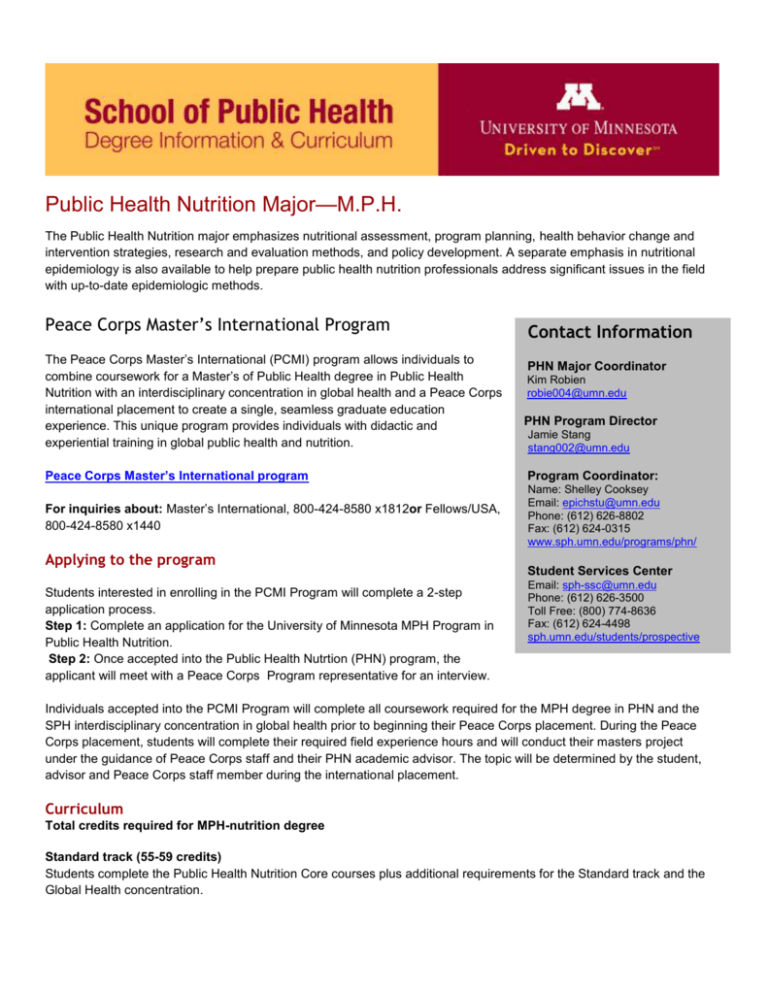
Public Health Nutrition Major—M.P.H. The Public Health Nutrition major emphasizes nutritional assessment, program planning, health behavior change and intervention strategies, research and evaluation methods, and policy development. A separate emphasis in nutritional epidemiology is also available to help prepare public health nutrition professionals address significant issues in the field with up-to-date epidemiologic methods. Peace Corps Master’s International Program The Peace Corps Master’s International (PCMI) program allows individuals to combine coursework for a Master’s of Public Health degree in Public Health Nutrition with an interdisciplinary concentration in global health and a Peace Corps international placement to create a single, seamless graduate education experience. This unique program provides individuals with didactic and experiential training in global public health and nutrition. Contact Information PHN Major Coordinator Kim Robien robie004@umn.edu PHN Program Director Jamie Stang stang002@umn.edu Peace Corps Master’s International program Program Coordinator: For inquiries about: Master’s International, 800-424-8580 x1812or Fellows/USA, 800-424-8580 x1440 Name: Shelley Cooksey Email: epichstu@umn.edu Phone: (612) 626-8802 Fax: (612) 624-0315 www.sph.umn.edu/programs/phn/ Applying to the program Students interested in enrolling in the PCMI Program will complete a 2-step application process. Step 1: Complete an application for the University of Minnesota MPH Program in Public Health Nutrition. Step 2: Once accepted into the Public Health Nutrtion (PHN) program, the applicant will meet with a Peace Corps Program representative for an interview. Student Services Center Email: sph-ssc@umn.edu Phone: (612) 626-3500 Toll Free: (800) 774-8636 Fax: (612) 624-4498 sph.umn.edu/students/prospective Individuals accepted into the PCMI Program will complete all coursework required for the MPH degree in PHN and the SPH interdisciplinary concentration in global health prior to beginning their Peace Corps placement. During the Peace Corps placement, students will complete their required field experience hours and will conduct their masters project under the guidance of Peace Corps staff and their PHN academic advisor. The topic will be determined by the student, advisor and Peace Corps staff member during the international placement. Curriculum Total credits required for MPH-nutrition degree Standard track (55-59 credits) Students complete the Public Health Nutrition Core courses plus additional requirements for the Standard track and the Global Health concentration. Nutritional Epidemiology track (67-68 credits) – Students complete the Public Health Nutrition Core courses plus additional requirements for the Nutrition Epidemiology track and the Global Health concentration Additional Credits for Peace Corps Service Students in either the Standard or the Nutrition Epidemiology track are required to complete a field experience and a master’s project. As described below, the master’s project provides 2 academic credits, while field experience provides 4 credits per semester enrolled. Students must remain enrolled for a minimum of 4 credits per semester while serving in the Peace Corps. The 27-month Peace Corps service period constitutes 4 semesters. Consequently PCMI students will earn 16 credits while serving in the Peace Corps. Of these credits, 2 will be for the master’s project, while the remainder will be field experience credits. Upon completion of Peace Corps service, PCMI students must complete the write-up of their Master’s Project and pass their oral examination to fulfill all requirements of the MPH-nutrition program. Additional Standard Track Curriculum Research Methods [6 total credits] ○ ○ ○ ○ ○ ○ ○ ○ ○ ○ ○ ○ ○ ○ ○ ○ ○ ○ ○ ○ PubH 6910 Critical Review of Research in Public Health Nutrition (1) PubH 7994 Master’s Project (2): Directed research toward completion of master’s project in public health nutrition Plus 3 research methods credits from the following list of courses. PubH 6034 Program Evaluation in Public Health Practice (3) PubH 6035 Applied Research Methods [prerequisite 6034] (3) PubH 6325 Data Processing with PC-SAS (1) PubH 6342 Epidemiologic Methods II [prerequisite 6341] (3) PubH 6415 Biostatistical Methods II [prerequisite 6414] (3) PubH 6420 Introduction to SAS Programming (1) PubH 6451 Biostatistics II [prerequisite 6450] (4) PubH 6617 Practical Methods for Secondary Data Analysis (3) PubH 6650 Community Based Participatory Research (1) PubH 6705 Community Health Assessment (3) PubH 6803 Conducting a Systematic Literature Review (2) PubH 6806 Principles of Public Health Research Fall (2) PubH 6852 Program Evaluation in Health and Mental Health Settings (2) PubH 6389 Nutritional Epidemiology [prerequisite 6341 or 6320] (2) PubH 7250 Designing and Conducting Focus Group Interviews (1) PubH 7251 Data Analysis from Focus Groups (1) Nurs 8171 Qualitative Research Design and Methods (3-4) Field Experience [14 credits] ○ PubH 7996 Field experience (14) This will be fulfilled through the Peace Corps placement during the PCMI Program. Students will sign up for these credits during their Peace Corps placement. Public Health Core [11-12 credits] ○ PubH 6101 Environmental Health (2 ) OR PubH 6102 (Issues in Environmental and Occupational Health (2) ○ PubH6320 Fundamentals of Epidemiology (3) OR PubH 6341 Epidemiologic Methods (3) ○ PubH 6414 Biostatistical Methods I (3) OR PubH 6450 Biostatistics I (4)\ ○ PubH 6741 Ethics in Public Health: Professional Practice and Policy (1) OR PubH 6742 Ethics in Public Research and Policy (1) ○ PubH 6751 Principles of Management in Health Service Organizations (2) Electives [11-12 credits] Health: Electives are fulfilled by Global Health Interdisciplinary concentration, which requires 12 credits. Standard Track students without a nutrition/dietetics undergraduate major additional Nutrition Science courses: ○ PubH 6355 Pathophysiology of Human Disease (4) OR Phsl 3051 Human Physiology (4) ○ PubH 6905 Nutrition for Public Health Promotion and Disease Prevention (2) FscN 4621W Nutrition and Metabolism (4) Additional Nutritional Epidemiology Program Curriculum Epidemiology core [24 or 28 credits] ○ ○ ○ ○ ○ ○ ○ ○ ○ PubH 6341 Epidemiologic Methods I (3) PubH 6342 Epidemiologic Methods II (3) PubH 6343 Epidemiologic Methods III (4) PubH 6390 Epidemiologic Methods III Lab (1) PubH 6325 Data Processing with PC-SAS (1) PubH 6389 Nutritional Epidemiology (2) PubH 6355 Pathophysiology of Human Disease (4) PubH 6450 Biostatistics I (4) PubH 6451 Biostatistics II (4) Plus one of the following : ○ ○ ○ ○ PubH 6385 Epidemiology and Control of Infectious Diseases (2) PubH 6386 Public Health Aspects of Cardiovascular Disease (2) PubH 6387 Cancer Epidemiology (2) PubH 6000 Obesity & Eating Disorders: Etiology, Treatment and Prevention (3) Field Experience/Master’s Project [16 credits total] ○ PubH 7996 Field Experience (14 – during PCMI) ○ PubH 7994 Master’s Project (2 – during PCMI) Public Health Core [5 credits] ○ PubH 6101 Environmental Health (2) OR PubH 6102 Issues in Environmental and Occupational Health (2) ○ PubH 6741 Ethics in Public Health: Professional Practice and Policy (1) OR PubH 6742 Ethics in Public Health: Research and Policy (1) ○ PubH 6751 Principles of Management in Health Service Organizations (2) Electives [11-12 credits] Electives are fulfilled by Global Health Interdisciplinary concentration, which requires 12 credits. Nutritional Epidemiology track students without an undergraduate nutrition/dietetics major additional courses: ○ FSCN 4621W Nutrition and Metabolism (4) ○ PubH 6905 Nutrition for Public Health Promotion and Disease Prevention (2)
